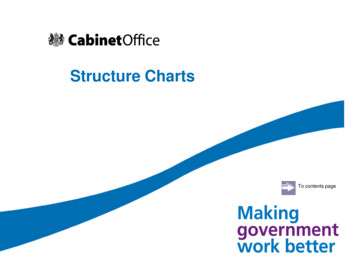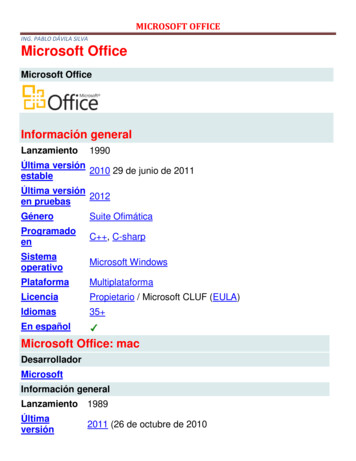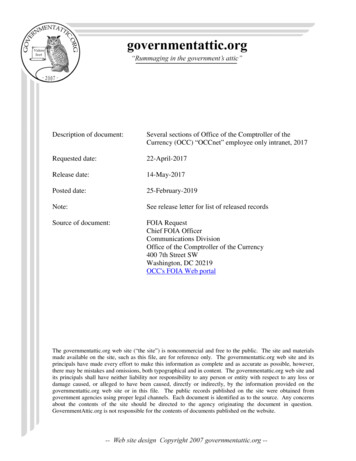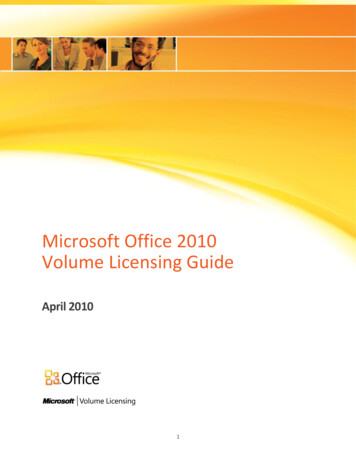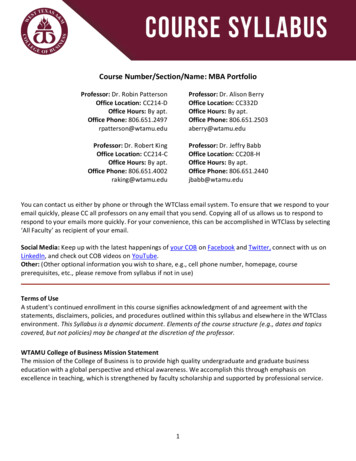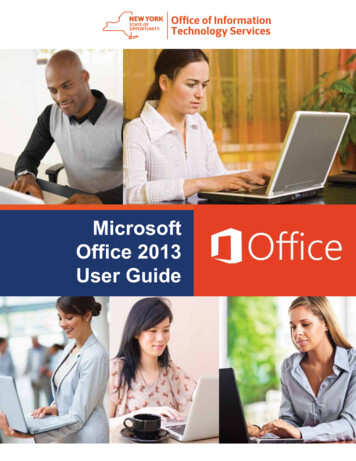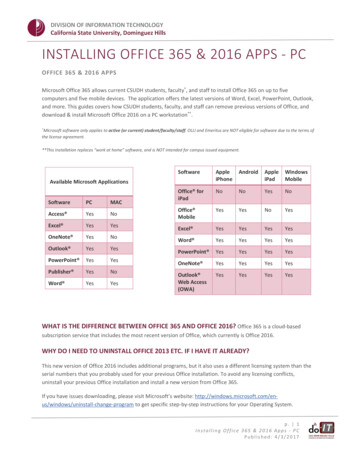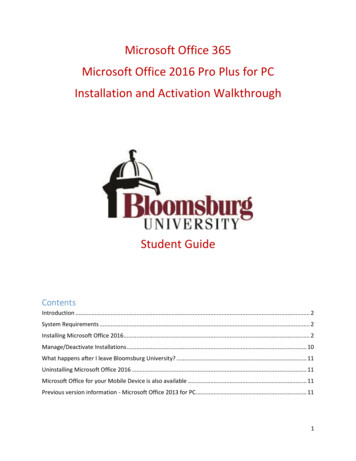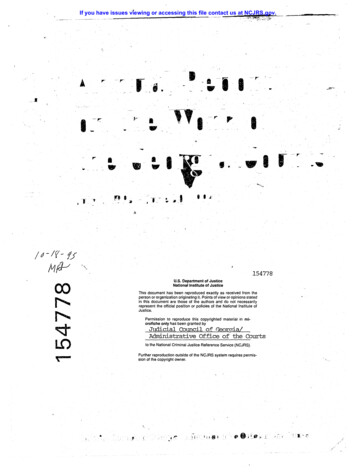
Transcription
If you have issues viewing or accessing this file contact us at NCJRS.gov.r-IiIr .'i.- ., I I.-r -",.JI.l/ tJ -., 11-.r- I. . ., I f rII-r .,-"."--Jl'-r . ' :. IJrI . -I., I r.", , .d»If - f3'M \.154778U.S. Department of JusticeNationallnslltute of JusticeThis document has been reproduced exactly as received from theperson or organization originating it. Points of view or opinions statedin this document are those of the authors and do not necessarilyrepresent the official position or policies of the National Institute ofJustice.Permission to reproduce this copyrighted material in mi·crofiche only has been granted byJudicial Council of r r0ialAdrninistrative Office of the Courtsto the National Criminal Justice Reference Service (NCJRS).Further reproduction outside of the NCJRS system requires permis'sion of the copyright owner."."'--r.
--------- . -----July 1, 1993 - June 30, 1994Judicial Branch in ReviewMessage from the Chief Justice . 3Fiscal Yea}' 1994 Highlights . 8Appropliations . 10The CourtsSupreme Court . . . 14Court of Appeals . . 16Superior Courts . . 18State Courts . 22Juverdle Courts . 25Probate Courts . 29Magistrate Courts . . 35Other Courts . . 39Judicial AgenciesJudicial Council of Georgia . . . 40Administrative Office of the Courts . . 41. . 45Board of Court Reporting .COIU1Cil of Juvenile Court Judges . . 47Council of Magistrate Court Judges . 48Council of Probate Court Judges . 49COlU1cil of State Court Judges . 49Council of Superior Court Clerks . 50Council of Superior Court Judges . 50Georgia Commission on Dispute Resolution . 52. C' CormmSSlOn. . . 5') ourts AutomatlOnGeorg18Georgia Indigent Defense COIU1Cil . 53Georgia Magistrate Courts Training COIDICil . 55Georgia State-Federal Judicial Council . 56Institute of Continuing Judicial Education . 56Judicial Administrative Districts . 59Judicial Nominating Commission . 59Judicial Qualifications Conmlission . 60Supreme Court Committee for Gender Equality . 63Judicial Persollnel Changes . . . . 64Published by the Judicial Council of Georgia and the Administrative Office of the Courts in compliance withOCGA §15-5-24 and by Order of the Supreme Court of Georgia dated June 12, 1978. All rights reserved.Judicial Council of Georgi!! Administrative Office of the Courts244 Washington Street, SW, Suite 550Atlanta, Georgia 30334-59000 (404) 656-51710Director, Robert L. Doss Jr. Senior CommllnicatioTlS OffLCer, Billie Dickerson Editor, Naney Kahnto Printed on recycled paper.00
Jml!ieiuH CouueH of G 'o1l"g'iaJUIU'1994Chief Justice Willis B. Htmt Jr.ChairSupreme CourtAtlantaJudge N. Kent LawrencePresident-electCouncil of State Court JudgesAthensPresiding Justice Robert BenhamVice ChairSupreme CourtAtlantaJudge H. Arthur McLanePresident-electCOlUlcil of Superior Court JudgesValdostaJudge Dorothy T. BeasleyCourt of AppeaJsAtlmltaChief Judge Bobby C. MilamNinth District Administrative JudgeBlue RidgeJudge Joe C. BishopSecond District Administrative JudgeDawsonJudge LaVerne C. OgletreeFirst Vice PresidentCouncil of Probate Comt JudgesGreensboroJudge Jmnes N. ButterworthPresidentCouncil of State Court JudgesComeliaJudge David L. CavenderFirst District Administrative JudgeHinesvilleJudge Philip F. EtlleridgePresidentCouncil of Superior Court JudgesAtlantaChief Judge Hilton FullerFourth District Administrative JudgeDecaturChief Judge Willimn F. GrantTenth District Administrative JudgeElbertonJudge William H. IsonSLxth District Administrative JudgeJonesboroChief Judge Isaac JenretteFifth District Administrative JudgeAtlmltaChief Judge Walker P. Johnson Jr.Third District Administrative JudgeMaconJudge Willimn W. Lavigno illPresidentCouncil of Juvenile Court JudgesConyers2------------ - .Judge Guy D. ""Pete" PfeifferFirst Vice PresidentCouncil of Magistrate Court JudgesCordeleChief Judge Marion T. Pope Jr.Comt of AppealsAtlantaChief Judge Tom PopeSeventh District Administrative JudgeCalhotmJudge Wayne M. PurdomPresidentComlcil of Magistrate Court JudgesDecaturJudge Ronald H. RentzPresident-electCouncil of Juvenile Court JudgesColquittChief Judge Willimn M. TowsonEighth District Administrative JudgeDublinJudge J olm \VheatonPresidentCouncil of Probate Comt JudgesLeesburg
, - - - - - - Message from the Chief Jusike - - - - - - Chief Justice Tflillis B. Hunt delivered the State of the Judiciary Address to theGeorgia GeneralAssemblyonJanuary 11,1995. Highlights of his remarksfollow.I know my presence here is less an opportunity to disseminate useful informationthan it is a symbol that the third branch of government indeed exists and that yourecognize our role, and we appreciate that. You understand that our enginp-s are fedprimarily by your work product. Almost everything you do finds its way to us.Whether your statutory enactments govem the substance and procedure of our tortcases, our divorce cases, or our criminal cases, or whether the laws you pass arcsimply presented to us for interpretation (because some people, believe it or not,don't know what you merul) , the produce of your work is am life blood.Courts do not make law, but they interpret it everyday, whether in the literalsense of the appellate flllletion or in the practical application of the trial courtsapproving or disapproving by their enforcement or rejection of your work product.And, it is that everyday, necessary, even intense, relationship between us, that I willreflect on in response to your kind invitation to be here.Should I do as my predecessors have done for the last eight yeru's, and that is,should I shower you with statistics that demonstrate the ongoing overload on yourstate comts and the fact that the comts' share of the statc budget has never exceededone percent--never reached one percent? You may recall Harold Clru'ke's eloquentplea two years ago reflecting on the song, "-Buddy, Can You Spru'e A Dimern ruldthen asking you, "'Buddy, Can You Spare a Penny?" But a penny could not be spru'edthen, and apparently cannot now. We get right at eight-tenths of one percent of thestate budget.I have decided not to dwell on that because everyone knows there is EUl unmetdemand for court time; everyone knows the courts are overloaded, a situation thatwill not be alleviated by stiffer sentencing laws or the upcoming Olympics. Youdon't have to be a lawyer or a judge to know that. And everyone knows that thereru'c far more demrulds for your money than Crul be met. There ru'e hard choices foryou to make. We understruld that. Education, for exrunple. You CruUlot be toogenerous as to educational needs. And, in fact, the more you address education, themore you fund it? the less will be needed for comts and conections-at least downthe road. Poming money into education is not a wastc; it is rul opportunity to attackthe source of crime problems rather than the consequences, as has always been donein the past.No matter what percent of the budget we have gotten, I think you have done aswell by us as present circumstances permit. In fact, as fru' as the Supreme Comt goes,you have been generous. Your generosity has permitted us to create and nurtm'eprogrruns we believe essential to the goal of equal justice and effecti ve justice. Thoseprogrruns include tlle Committee for Gender Equality, the Conunission on Racial3
and Ethnic Bias, the Office of Disput(, Resolution (ADH), Courts Automation, multhe new Conmlittee on Substmlce Abuse' and the Courts. Over the past three yearsyou have doubled funding for indigent defense. These are important programs withimportant goals and we, the judiciary and the legislature, are jointly fulfilling ourresponsibility to pursue them.Supt"rior courtsYou have fulfilled yom responsibility to the superior courts-the principal trialcourts of the state. You have agreed to add judges, but yom hands are tied by federalvoting-rights litigation. We pray for a speedy resolution, mld a fairresolution as well.To meet the cmrent demmld, om superior courts have absorbed all availablesenior judges mldmmlY, mmly magistrates, juvenile comt judges, and probate comtjudges. Much of the fanlily law workload in the superior courts has been shifted tomagistrates. These are emergency times and tilis is an emergency measure-but itis troubling.It is at the heart of dissatisfaction mld disenchantment of family court litigm1tsmld lawyers. Fmruly law problems go beyond the lack of judge power. We all knowthat mHl we, mld the members of the State Bar, and a number of you, are workingwith the Family Court Conmlission to address the overall problems and the wisdom,the feasibility of a family comt. The citizens have authorized pilot programs in thisfield mld you will consider those. This is not the time under all the attendm1tcircumstmlces, to alter the discretionary appeals process. Let"s not attack theproblem piecemeal with a short-term solution, but address the whole problemthrough the study of the comnlission, the pilot programs, mld the eventual additionof superior court judges. The trial courts desperately need help. What is mostneeded is more judg 's, but you cmmot address that now.Appellate courtsI have not overlooked om Court of Appeals, I have saved them for last becausethey need your help, and you cml help them. For everyone opinion that I mld mycolleagues on the Supreme Court write, my collea{,'11eS on the Court of Appeals eachwrite five-or is it six? They are basically writing one opiJlion for each workday, anenormous load-an impossible load. They seek your help in order to providesufficient staff to keep them afloat mld I know you \vill be responsible and meettheir needs. Be generous with them. Don't compronlise, be generous. They m'ethe hardest working appellate judges in the country, and they need mld deserveyour help.To be honest, they need more than staff. They need, although they may notagree with me, they need the benefit of a restructured appellate court system. Theyneed more judges-either on their comt or at least on another appellate tier- butyou cannot solve that now, even if we were to agree how to solve it.So there you have it. You get a lligh grade from me. We m'e {,'Tateful for whatyou do, mld T:11ank you once again for the across-the-board pay raise you gave alljudges last year. You were generous-most generous. Decent compensation says alot about the state of our judicim'y mld we m'e grateful that you recognized mld metour need.4
!:h·iection i()f judgesWe are also grateful that a decade ago you were ,vise enough to let the peopletell us through their constitution that judges' elections should be nonpartisan. Wehave thereby avoided the confusion and distress suffered by our neighbors inAlabama, North Carolina, and Texas. The pressure of party politics and politicalaction committees has cast a dark shadow on the legitimacy of their method ofselecting judges.But our system still deserves scrutiny. The underlying challenges of the votinglights case must eventually be addressed, regardless of the outcome. And, thewisdom of statewide judicial elections remains in question. In twenty yearsappellate comt incumbents have faced opposition ten times and won nine of thosetimes-a track record that challenges the system. Should a newly appointedmember of either of these two courts be required to face election within a few monthsafter taking office? Is that fair to the jlldge? Is it fair to you and the rest of the votingpublic? Will we see the sanle increase in campaign contributions-mainly frominterested lawyers-as has occurred in Alabama, North Carolina, mId Texas? Ihope not, but I anI worned about it and you should be too.VisionLet me conclude with a vision-my vision of what our conrt system should beand, yes, it will cost more than a tenth of one percent of the state budget. But youwill have plenty of lead time to adjust. It is a vision that no other judge necessarilyshm'es, but you get it from me for the price of admission.Beyond the probate and magistrate courts which could be joined together, butprobably never will, there would be three tiers.There would be one trial court-the Superior Court, 'with a fannly law division,including juvenile matters, and perhaps a criminal division. All civil mId criminalcases would go there mId superior court judges could try something besides divorcemlcl felonies. Why have both superior courts mId state courts? There is no reason.State trial courts should be ftmded by state moneys.There would be a well staffed mediation/arbitration office through which mo')tof the civil work would be flUllleled initially. There would be-as there is now Ltsome states-ml appellate division of the superior COUTt. Regionally, perhaps bycongressional district (as judicial districts are now divided), there would be a pmlelof tlu'ee judges who would hem' direct appeals from all civil cases, frurJly lawincluded, mId most criminal cases. They would provide for a review of fact and lawin these cases, many of wlnch are now discretionary. This appellate division wouldbe a primary court of appeals. Our present Court of Appeals, on the other hruId,would be a true intermediate court of appeals. It may well need no more members.It would take capital cdminal cases on direct appeal, but others would be largelydiscretionary. Because of the work of the primary court of appeals. its ,vorkloadwould be greatly reduced. It would be mmlageable; it would be important. It wouldbe the high error-con'ecting court:.The Supreme Court then, except for death penalty cases, constitutional issues,tlLX cases, mId claims against the state, would be a true cert COUlt. It would take itscases by writ of certiorari to the Court of Appeals. Unlike now, the Supreme Comt5
mld the Court of Appeals would not be doing tlw mlle thing-they would not besharing the error-correcting function. That would primarily rest with the Court ofAppeals and the primary appellate division. The Supreme Court could fulfill it principal role, that of molding the common law, that of intprpreting the constitution, mld that of overseeing the legal profession-an increasingly importmlt andlll'gent role. The Supreme Court would speak to broad issues of justice mld equality.The judges of these courts would be fairly selected by a method that wouldinsulate them as far as possible from IDlwmIted political presslll'e, but would permitthe voters to decide, either directly or indirectly, who serves. That method wouldalso inslll'e the selection of judges who look like the people of this statcrepresentation as to gender and to race.Well, there you have it. Simple, right? It will corne, as do all judicial reforms,in increments. But it will corne-trust me-I've seen tlw process close up for 24yem's mId something like my suggestion, similar to my uggestioll, will mTive. It isnot unlike the product envisioned by Paul Broun, Larry Walker and Roy Bm'nes(mId myself) in 1984 on the Governor's Commission on Juclicial Processes-Justice2000. It is a vision that would simplify mldinmleasurably enhmlce the administration of justice mld you-with responsibility, gratitude, humility mId vision-,vill beproud to fund it.There is one more word that descIibes better than mly other the journey, theodyssey, the pilgrimage of the COlll'ts in our search for justice, and that is persistence.We have a great pm'tnership-om two brmlches-together we will persist andprevail for the people we serve.Ceremonies on March 3, 1994, installed Jllstice Willis B. Hunt Jr. as Georgia's25th chief jllstice. Jllstice Hllnt succeeded Chief Justice Harold C. Clarke whoretired March 1.6
SUPREME COURT7 justicesjurisdiction: Appellate jurisdiction over cases ofconstitutional issue, title to land, validity of and construction of wills, habeascorpus, extraordinary remedies, convictions of capital felonies, equity, divorce,alimony, election c;)ntest. Certified questions and certiorari fromCourt of Appeals.Capital felonies.Constitutional issues.Title to land.Wills, equity, and divorce.COURT OF APPEALS9 judges (3 divisions)jurisdiction: Appellate jurisdiction over lower courtsin cases in which Supreme Court hasno exdu:ive appellate jurisdiction.Counties with populationover 100,000 where probatejudge is attorney practicing atleast seven years.ISUPERIOR COURTjury trials.46 circuits, 145 judges (159 authorized)jurisdiction (genera/): Civil law actions, misdemeanors, andother cases. Exclusive jurisdiction over cases ofdivorce, title to land, equity. Exclusive felony jurisdiction. ---------r----- --- jury trials.ISTATE COURT(64 courts)90 judges (91 authorized);44 full-time, 46 part-time.jurisdiction (limited): Civil law actions exceptcases within the exclusivejurisdiction of superiorcourt. Misdemeanors, traffic,felony preliminaries.jury trials.JUVENILE COURT(159 courts)53 judges: 17 full-time,36 part-time (1 state courtjudge serves as a part-timejuvenile court judge),32 associate judges.Superior court judges servein counties without separatejuvenile court judges.jurisdiction (limited): Deprived, unruly,delinquent juveniles. Juvenile traffic.IPROBATE COURT(159 courts)159 judgesjurisdiction (limited): Exclusive jurisdiction inprobate of wills, administration of estates, appointmentof guardians, mentally ill,involuntary hospitalizations, marriage licenses. Traffic in some counties. Hold courts of inquiry. Search warrants and arrestwarrants in certain cases.MUNICIPAL COURTSjurisdiction (limited): Ordinance violations,traffic, criminalprel iminaries.No jury trials.COUNTY RECORDEI'sCOURT(4 courts)8 judgesjurisdiction (limiled): County ordinances,criminal warrants andpreliminaries.No jury trials.jurisdiction (limited): Search and arrest warrants,felony and misdemeanorpreliminaries, misdemeano;bad check violations. Civil claims of 5,000 orless, dispossessories, distresswarrants, county ordinances.No jury trials.No jury trials.(373 courts active)MAGISTRATE COURT(159 courts)159 chief magistrates and318 magistrates; 29 also servejuvenile, probate or civilcourts.CIVil COURT(2 courts)3 judges(1 court in Columbus)1 judgeJurisdiction (limited):Jurisdiction (limited): Warrants. Misdemeanorand felony preliminaries. Civiltorl and contract casesunder 7,500 for BibbCounty; under 25,000for Richmond County. Civil law and landlordtenant cases (civil) under 7,500. Misdemeanor gUilty pleasand preliminary hearings. Warrants.jury trials.}lIry trials ill civil cases.MUNICIPAL COURT7
July 1993Fiscal year begins with judicial branch budget of: 63,674,960.Georgia Courts Automation Commission (GCAC) began installation and pilot testing of SUSTAIN, courtcase-management software.August 1993Supreme Court Commission on Racial and Ethnic Bias in the COlm System meets for diversity trainingsessions led by Dr. Jacob Herring of California.State Bar Commission on Judicial Compensation meets to discuss objectives and strategies forincreasing compensation for appellate and superior court judges.September 1993Supreme Court meets on the original site of the Cherokee Nation Supreme Court at New Echota inNorth Georgia to pay tribute to Native American heritage.Portrait ofIate Chief Justice Charles L. Weltner presented to the Supreme Court of Georgia and hungin the courtroom. The portrait originally hung in the Fulton County Courthouse.October 1993First public hearing of the Commission on Racial and Ethnic Bias takes place October 1 at the DeKalbCounty Public Library in Decatur. Supreme Court Justice Robert Benham opens the meeting.Commission hears testimony fTom judges, lawyers, city officials and others. The commission's secondpublic hearing is held October 29 at Georgia Southwestern College in Americus.The Georgia Conference on Substance Abuse and the Courts is held in Athens on October 27 and 28,bringing together judges, prosecutors, defense la\vyers and others to address the problems ofsubstance-abuse related crime and its impact on the court system. Judge Harl Haas of Portland,Oregon, and Judge Kathleen Gearin of St. Paul, Minnesota, are the invited speakers. Twenty-fivejudicial circuits and 125 individuals participate in the two-day meeting.Georgia Commission for Gender Equality approves a model policy for the handling of sexualharassment complaints to "achieve a workplace free from sexual harassment by establishing aprocedure for submitting complaints, and for the investigation and resolution of these complaints."November 1993Report and recommendations issued by the Judicial Compensation COl1l1russion find that currentjudicial salaries are neither fair nor adequate.Commission on Racial and Ethnic Bias hearings are held November 19 in Savannall at ArmstrongState College.December 1993Judicial Council recol1l1nends creation of 16 additional superior court judgeships. Recommendationsare sent to Governor Zell Miller and the General Assembly. The Administrative Office of the Courtspresents superior court case load data for the 46 judicial circuits showing total filings per superior courtjudge at 1,191 civil cases and 763 criminal cases.Commission on Racial and Ethnic Bias hearings are held December 3 in Dalton at the NorthwestGeorgia Trade Center.8
January 1994Revised Code of Judicial Conduct becomes effective January 1. The revisious were suggested by theJudicial Qualifications Commission and bring Georgia up to date with the American Bar Association1990 Model Code of Judicial Conduct. The new code features a preamble, a glossary of key terms andspeaks to concerns regarding sJcietal fairness and cultural diversity. Georgia's judicial code of conductwas last updated in 1984.Chief Justice Harold C. Clarke delivers his final State of the Judiciary Address to the GeneralAssembly. Justice Clarke calls for patient remedies attacking the causes of crime. He suggests servicesto teenage mothers and drug abusers, education on the value of humanity and conmnmity programsthat offer hope to the young and disadvantaged. Chief Justice Clarke retires from the bench at the endof February.Conmnssion on Racial and Ethnic Bias holds hearings Janun:ry 21 in Augusta.February 1994The Georgia Commission on Faunly Violence L%ues a report on its first year of activities focusing onreuucing domestic violence.Chief Justice Clarke receives first Harold G. Clarke Equal Justice Award recognizing his strongleadership in support of indigent defense.Connnission on Racial and Ethnic Bias recommends that orientation and continuing educationprograms for judges and court personnel include a component of cultural diversity and gensitivitytraining.March 1994Willis B. Hunt Jr. becomes the 25th Chief Justice of the Georgia Supreme Court in ceremonies held3 in the Supreme Court courtroom. IarchApril 1994Final public hearing by the Couuuission on Racial Ethnic Bias is held April 8 at Georgia StateUniversity in Atlanta.Governor ZeU Miller signs into law a measure increasing base salaries for appellate conrt justices andjudges and superior court judges. The General Assembly acted on recommendations of the JudicialCompensation Commission.May 1994The Georgia Commission on Gender Equality meets on May 13 and endorses distribution of the CourtConduct Handbook. The pamphlet addresses behaviors that are forms of gender, race and ethnicbias.Examples of offensive conduct are presented, as well as guidelines and suggestions to avoid suchbehavior.June 1994Judicial Council meets in Savannah 011 June 15.State Bar of Georgia begins forming a Commission on Family Courts. The commission's goal isto evalnate and improve the delivery of judicial services to families and children in Georgia withrespect to family law issues. The conmussion will review pilot family court projects in Georgia andotller states.9
Stat · AppropriaHmn for tlw Judit'iall HraHwh: Fit-waRFY 1993AmendedAppropriationBudget UniUAgencyFY 1994AmendedAppropriationY{'ai' n99:t n994 andn99 1995GeneralAppropriationPercentChangeFY 94-95PercentChangeFY 93-94 4,893,172 5,201,9096.3% perior Courts (Total)OperationsCouncil of Superior Court JuugesJudicial Auministrative DistrictsProsecuting Attorneys' CouncilSentence Review 6.7%7.0%6.8%Council of Juvenile Court Judges847,005911,8037.7%1,023,53012.3%Institute of Continuing Juuicial Education (Total)OperationsMagistrate Courts Training 01,2'H,331S61,763682,568 60,828,071 63,674,9604.7% 69.625,272Supreme CourtCourt of AppealsJudicial CouncilOperationsBoard of Court ReportingCase CountingCouncil of Magistrate Court JudgesCouncil of Probate Court JudgesCouncil of State Court JudgesCouncil of Superior Court ClerkoAppellate Resource CenterComputexized Information NetworkJudicial Qualifications CommissionIndigent Defense CouncilGeorgia Courts Automation Commission (Total)OperationsComputerized Information NetworkJudicial Branch Totals 009.3%Appropriations - - - - - - - - - The total state budget rose by 6.3 percent for fiscal year 1994; appropriationsto the judicial branch increased by 9.3 percent. The judicial branch budgetincludes ftUlds for 14 superior court judgeships [Illd related positions thatcannot be filled tmtil final settlement of federal voting-rights litigation. No newjudgeships were approved by the General Assembly in 1994.10
fHui('Judi('iu BI'UlH'h Hhldl!(·t rnitl'l: f{md AvuHahh- and Y':xp«'nditm:t'!'iFhwul Y{'url994SupremeCourtCourt ofAppealsSuperiorCourtsFunds AvailableGeneralSupplementalTotal State FundsFed ral FundsOther Funds 5,131,90986,4005,218,30977,458539,761 5,778,18241,7045,819,886 tal Funds Available 5,835,528Councilof Jm'elliIeCourtJudgesInstitute ofContinuingJudicialEducationJudlcialJudicial QualificationsCouncil 493,165 639,950 2,286,77.3102,5797,500647,450 2,389,3526,689445,157115,346155,614 146,228 1,000,000 64,783,17 70-1,091,817146,228 1,000,000 63,691,36056,2302,660,5221,926,1434,721,994 5,879,147 51.251,875 1,219,117 769,485 2,990,123 146,228 2,982,373 71,073,876ExpendituresPersonal Services 4,245,086Regular Operating Expenses447,852Travel38,189Eqmpment Purcha.qes137,574188,183Computer Char .sHeal Estate Hentals302,355Telecommunications47,837Ppr Diem, Fees & Contract.'i347,422 5,110,448120,07124,427142,159123,6
Council of Juvenile Court Judges Conyers Judge N. Kent Lawrence President-elect Council of State Court Judges Athens Judge H. Arthur McLane President-elect COlUlcil of Superior Court Judges Valdosta Chief Judge Bobby C. Milam Ninth District Administrative Judge Blue Ridge Judge LaVerne C. Ogletree First Vice President

![Office 2010 Professional Plus Com Ativador Serial Keyl [EXCLUSIVE]](/img/61/office-2010-professional-plus-com-ativador-serial-keyl-exclusive.jpg)
